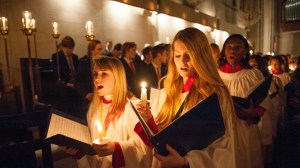For many people, John Bunyan (1628–1688) is an enigma. A statue of Bunyan as a denominational figure adorns the headquarters of the Baptist Union in Great Britain; yet Bunyan is claimed also by the Congregationalists. During his lifetime, his denominational affiliation, at best, was misunderstood.
A tinker by trade, Bunyan in his early life was a blasphemous, profane individual known for his misdeeds in his native Elstow in Bedfordshire. His stint in the Parliamentary Army (1644–1647) probably did little to improve his behavior, though it did expose him to Baptists and others who took their religious profession seriously. About 1653 he experienced a conversion and sought believer’s baptism from Andrew Gifford, pastor of a Particular Baptist church in Bedford.
In the later 1650s Bunyan began to preach publicly and was well received for his abilities to make gospel truths plain and to put his hearers under the spell of his stories. When King Charles II was restored to the throne in 1660, nonconformist preachers came under renewed persecution, and Bunyan was imprisoned. During his twelve-year confinement, he read extensively and wrote some of his most famous works, including Grace Abounding to the Chiefest of Sinners. When he was released in 1672, he became more active in the church and succeeded Gifford as pastor.
For the remainder of Bunyan’s career, though he served as a highly gifted pastor and achieved renown as a writer, he was a problem for many Baptists who desired sharply defined distinctions when it came to the ordinances. Bunyan, while he owned baptism to be God’s ordinance, “would not make an idol of it.” This meant that Bunyan would not deny anyone participation in the Lord’s Supper because that person lacked the proper baptism. Early in 1673 Bunyan pressed his viewpoint in a book titled Differences in Judgement About Water Baptism No Bar to Communion, which irritated many of the Particular Baptists. But Bunyan, and his church after him, remained steadfast in the open Communion stance and maintained fellowship with both Baptists and Congregationalists.
His chief literary work, The Pilgrims Progress (1678), is a classic in English literature. An allegory that narrates the difficult path of “Christian” through the Slough of Despond, the Valley of the Shadow of Death, and Vanity Fair to the Celestial City, Pilgrims Progress is an account of the Christian experience, perhaps Bunyan’s own. En route, the main character encounters unforgettable folk like Worldly Wiseman, Talkative, and Facing-both-Ways. Many literary critics believe that the places and figures in the epic are but a mirror of Bunyan’s Bedfordshire with an ironic twist of the author’s sense of humor. Whatever the case, within ten years of its publication more than a dozen reprintings were called for, and the book has now been printed in over one hundred languages and is second in sales only to the Bible as the all time best seller.
Copyright © 1985 by the author or Christianity Today/Christian History magazine. Click here for reprint information on Christian History.




